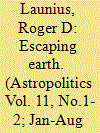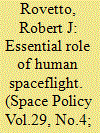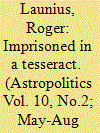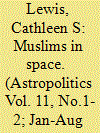|
|
|
Sort Order |
|
|
|
Items / Page
|
|
|
|
|
|
|
| Srl | Item |
| 1 |
ID:
122526


|
|
|
|
|
| Publication |
2013.
|
| Summary/Abstract |
What if we viewed the history of human spaceflight somewhat less through the lens of Cold War politics, which admittedly was central to the race to the Moon, but more as an expression of what might be called a religion of spaceflight? There seems to be a deeply religious quality to advocacy for the investment in and support for human space exploration, lending to the endeavor of a "higher purpose" that helps to explain both the generous nature of the actual investment and the ultimate unwillingness of Americans to eviscerate space budgets despite less than full support for space exploration. This article examines religious conceptions as a means of analyzing what might be termed a "space gospel." I lay out here the proposition that human spaceflight may be viewed as a religion with similar attributes to those present in mainstream religious denominations. This approach to exploring the history of human spaceflight offers a different and useful frame of understanding that broadens basic conceptions about this aspect of the human past.
|
|
|
|
|
|
|
|
|
|
|
|
|
|
|
|
| 2 |
ID:
127501


|
|
|
|
|
| Publication |
2013.
|
| Summary/Abstract |
The question is: should the United States and nations at large pursue a human spaceflight program (and if so, why)? I offer an unwavering positive answer to this question, and state the reasons for it while considering the broad challenges and benefits of (human) spaceflight. Space exploration is a human activity that is intrinsically forward-looking, and as such, has positive potential. Both national and international space programs can galvanize the population, inspire the youth, foster job-creation, and motivate the existing workforce. The nature of the enterprises involved-their scale, novelty, and complexity-requires a steady and continuous upward progression toward greater societal, scientific and technological development. That is, in order to overcome the challenges of human spaceflight, progress is required. More to the point, the survival of humanity depends on expanding beyond the confines of our planet. Human spaceflight, in short, presents us with an opportunity to significantly advance the nation and the global community.
|
|
|
|
|
|
|
|
|
|
|
|
|
|
|
|
| 3 |
ID:
114246


|
|
|
|
|
| Publication |
2012.
|
| Summary/Abstract |
This essay focuses on the decision by senior National Aeronautics and Space Administration (NASA) officials at the creation of the agency to focus its efforts on human spaceflight, Moon and Mars missions, and human settlement of the solar system. Its leaders made a conscious decision to downplay space applications projects, exclusive of technological research and development, and eschew operational activities. They did so in favor of concentrating on the human exploration and development of space. In so doing, NASA fell into the prestige trap that dominated this mission in the 1950s and early 1960s. At sum it was a tesseract, a four-dimensional object, which locked NASA into a quest for ever greater space spectaculars featuring human involvement. Power and prestige, therefore, has cast a long shadow on the space agency, forcing it into a series of programs that have been oversold and undervalued.
|
|
|
|
|
|
|
|
|
|
|
|
|
|
|
|
| 4 |
ID:
122531


|
|
|
|
|
| Publication |
2013.
|
| Summary/Abstract |
The first men to fly into space precipitated comments about religion and God, but for most of the history of human spaceflight these comments related to Christianity. As International Space Station partners recruit spacefarers from Islamic countries, they face new religious challenges. Islam is distinct from other large monotheistic religions by virtue of the fact that Muslim worship practices require routine attention to Earth geography and astronomy. It is a vantage point that changes in low Earth orbit. Recent Muslim astronauts and cosmonauts have led the way in adapting religious practices to their position above the Earth.
|
|
|
|
|
|
|
|
|
|
|
|
|
|
|
|
| 5 |
ID:
132717


|
|
|
|
|
| Publication |
2014.
|
| Summary/Abstract |
In 2009 President Obama proposed a budget for the National Aeronautics and Space Administration (NASA) that canceled the Constellation program and included the development of commercial crew transportation systems into low Earth orbit. This significant move to shift human spaceflight into the private sector sparked political debate, but much of the discourse has focused on impacts to "safety." Although no one disputes the importance of keeping astronauts safe, strategies for defining safety reveal contrasting visions for the space program and opposing values regarding the privatization of U.S. space exploration. In other words, the debate over commercial control has largely become encoded in arguments over safety. Specifically, proponents of using commercial options for transporting astronauts to the International Space Station (ISS) argue that commercial vehicles would be safe for astronauts, while proponents of NASA control argue that commercial vehicles would be unsafe, or at least not as safe as NASA vehicles. The cost of the spaceflight program, the technical requirements for designing a vehicle, the track record of the launch vehicle, and the experience of the launch provider are all incorporated into what defines safety in human spaceflight. This paper analyzes these contested criteria through conceptual lenses provided by fields of science and technology policy (STP) and science, technology, and society (STS). We ultimately contend that these differences in definition result not merely from ambiguous understandings of safety, but from intentional and strategic choices guided by normative positions on the commercialization of human spaceflight. The debate over safety is better considered a proxy debate for the partisan preferences embedded within the dispute over public or private spaceflight.
|
|
|
|
|
|
|
|
|
|
|
|
|
|
|
|
|
|
|
|
|